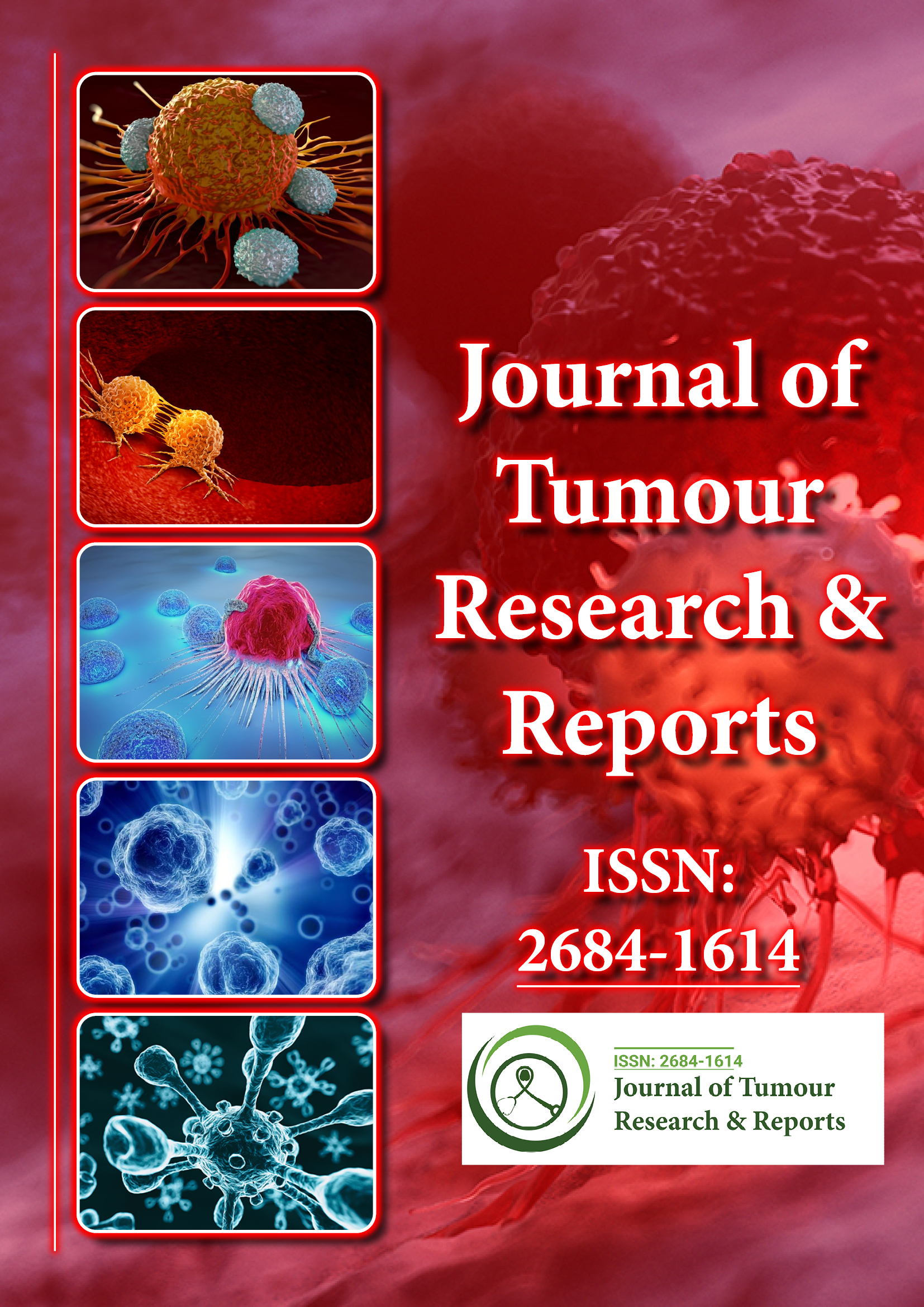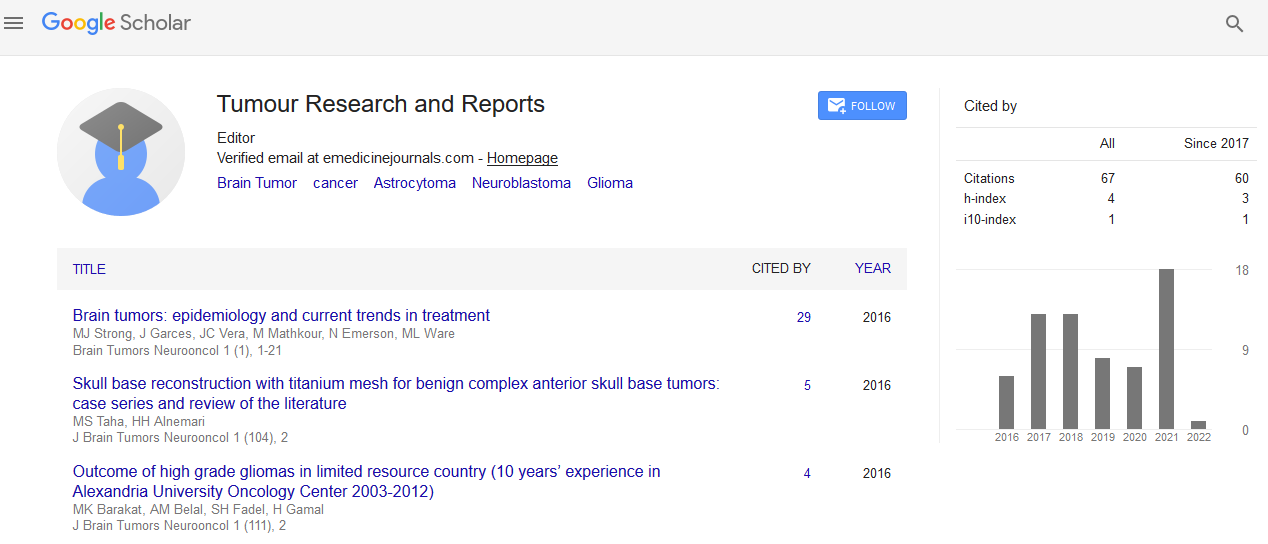Indexed In
- RefSeek
- Hamdard University
- EBSCO A-Z
- Google Scholar
Useful Links
Share This Page
Journal Flyer

Open Access Journals
- Agri and Aquaculture
- Biochemistry
- Bioinformatics & Systems Biology
- Business & Management
- Chemistry
- Clinical Sciences
- Engineering
- Food & Nutrition
- General Science
- Genetics & Molecular Biology
- Immunology & Microbiology
- Medical Sciences
- Neuroscience & Psychology
- Nursing & Health Care
- Pharmaceutical Sciences
Perspective - (2023) Volume 8, Issue 1
Epigenetic Alterations in Tumour Development and Progression
Sharon Munitz*Received: 03-Mar-2023, Manuscript No. JTRR-23-20327; Editor assigned: 07-Mar-2023, Pre QC No. JTRR-23-20327 (PQ); Reviewed: 22-Mar-2023, QC No. JTRR-23-20327; Revised: 29-Mar-2023, Manuscript No. JTRR-23-20327 (R); Published: 06-Apr-2023, DOI: 10.35248/2684-1614.23.8.182
Description
Cancer is a multifactorial illness caused by the buildup of genetic and epigenetic alterations. Epigenetic changes, such as DNA methylation, histone modifications, and non-coding RNA expression, are important in regulating gene expression and are implicated in tumour development and progression. In this study, they will look at the various kinds of epigenetic changes that occur in cancer and how they affect tumour biology.
Epigenetic alterations in cancer
DNA methylation: DNA methylation is a typical epigenetic modification in which a methyl group is added to the cytosine base of DNA. Methylation of promoter regions in the genome is usually associated with gene expression repression, whereas methylation of gene body regions is associated with increased transcriptional activity. DNA methylation patterns are frequently changed in cancer, resulting in changes in gene expression and tumour phenotype. Tumor suppressor genes can be inactivated by hypermethylation, whereas oncogenes can be overexpressed and activated by hypomethylation.
Histone modifications: Histones are proteins that package DNA into chromatin, and their modification can influence gene expression by changing the structure of the chromatin. Acetylation, methylation, phosphorylation, and ubiquitination are examples of histone changes. These modifications can appear on specific amino acid residues within the histone protein and, based on the type and location of the modification, can either promote or inhibit gene expression. Histone modifications are frequently changed in cancer, resulting in changes in gene expression and tumour phenotype. Histone Deacetylases (HDAC) inhibitors, for example, have been shown to cause differentiation and cell death in cancer cells by promoting histone acetylation and gene expression changes.
Non-coding RNA: Non-coding RNA molecules, such as microRNAs and long non-coding RNAs, can also influence gene expression and play a vital part in the development and progression of cancer. MicroRNAs are small RNA molecules that can bind to messenger RNAs (mRNAs) to either inhibit or support their translation, whereas long non-coding RNAs can interact with DNA, RNA, or protein molecules to influence gene expression. Non-coding RNA expression dysregulation can result in changed gene expression and tumour phenotype.
Impact of epigenetic alterations on tumor biology
By altering gene expression and regulating cellular processes such as proliferation, differentiation, and apoptosis, epigenetic changes can have a significant effect on tumour biology. In this section, they will look at some of the main ways that epigenetic changes contribute to tumour formation and progression.
Oncogene activation
Epigenetic changes can also activate oncogenes, which encourage tumour growth and survival. Oncogene promoter hypomethylation can result in overexpression, and histone modifications can also play a part in gene activation. Because of histone acetylation and other modifications, the oncogene MYC, for example, is commonly overexpressed in cancer.
Chromatin remodeling
Epigenetic changes can influence gene expression and cellular processes by altering chromatin structure. Histone acetylation, for example, can result in a more open chromatin structure that supports gene expression, whereas histone methylation can result in a more closed chromatin structure. Finally, epigenetic changes regulate gene expression and cellular processes such as proliferation, differentiation, and apoptosis, which are important in tumour formation and progression.
Among the main epigenetic modifications that occur in cancer are DNA methylation, histone modifications, and non-coding RNA expression. These changes, among other things, can result in the inactivation of tumour suppressor genes, the stimulation of oncogenes, and the remodelling of chromatin structure.
Understanding epigenetic changes in cancer is critical for creating novel therapeutic strategies that target these alterations. Epigenetic therapies for cancer, such as HDAC inhibitors and DNA methylation inhibitors, are presently being developed and tested in clinical trials. Personalized treatment methods that take into consideration an individual tumour's epigenetic profile may also help improve patient outcomes in the future. Further research into epigenetic alterations in cancer will surely cast light on the mechanisms of tumour development and progression, paving the way for novel cancer treatment approaches.
Citation: Munitz S (2023) Epigenetic Alterations in Tumour Development and Progression. J Tum Res Reports. 8:182.
Copyright: © 2023 Munitz S. This is an open-access article distributed under the terms of the Creative Commons Attribution License, which permits unrestricted use, distribution, and reproduction in any medium, provided the original author and source are credited.

